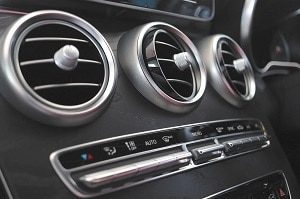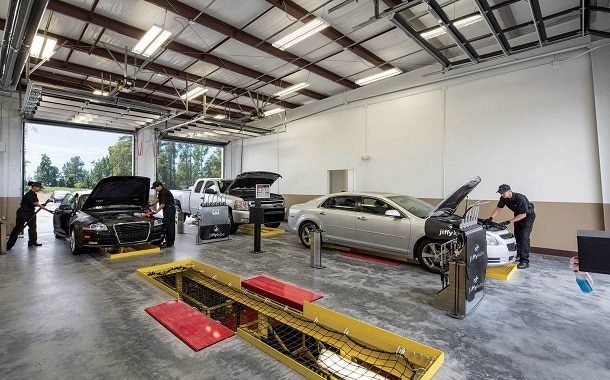How Much Does a Jiffy Lube AC Recharge Cost?
Last Updated on February 9, 2024
Written by CPA Alec Pow | Content Reviewed by ![]() CFA Alexander Popinker
CFA Alexander Popinker
The air conditioning system in your car plays a crucial role in providing comfortable driving conditions during the hot summer months. But over time, the refrigerant in the system can leak out, leading to reduced cooling capacity.
Getting an AC recharge service at Jiffy Lube is one way to restore your AC system to proper working order. But how much does an AC recharge cost at Jiffy Lube? Let’s take a closer look.
How Much Does a Jiffy Lube AC Recharge Cost?
On average, the cost of an AC recharge at Jiffy Lube ranges from $119.99 to $159.99. However, the exact price can vary depending on your vehicle make and model, as well as additional services needed.
Acurazine.com mentions that in 2009, $119.95 was considered a reasonable price for the A/C Recharge Service, with most shops charging about $150.
According to Jiffylube.com, labor costs for A/C recharge and repairs can vary and may range between $200 and $500, depending on the specific component that requires servicing or replacing.
Jiffylube.com also provides information on A/C Evacuation and Recharge, stating that the cost can vary and that not all services are offered at each Jiffy Lube location. Specific pricing is not provided on the website.
Maintaining your car’s AC is important for comfort and safety, so the cost is well worth it. Keep reading to learn all about Jiffy Lube AC recharge services and what factors into the pricing.
What is an AC Recharge?
An AC recharge, also known as a refrigerant recharge or AC system refill, involves adding more refrigerant (Freon) into your vehicle’s air conditioning system. Refrigerant is the compound that enables the AC system to produce cold air and dehumidify the interior air.
Over time, refrigerant can leak out through seals and gaskets in the AC components. This reduces cooling capacity and efficiency. An AC recharge adds fresh refrigerant to optimize system performance and cooling once again. Recharging the AC is part of routine maintenance for your car.
AC Recharge Services at Jiffy Lube
Jiffy Lube uses professional automotive equipment to recharge your AC system with R-134a refrigerant. Their standard recharge service includes:
- Checking for leaks and issues with AC components
- Adding UV leak detection dye
- Performing a system evacuation to remove moisture
- Recharging the system with new R-134a refrigerant
- Performing a vacuum test and testing the recharged AC for proper operation
Technicians will check your system pressures, output temperatures, and airflow to ensure optimal cooling has been restored. This complete AC recharge service provides a reliable fix for diminished AC cooling issues.
What Factors Affect the Cost?
The cost for an AC recharge at Jiffy Lube depends on a few factors:
- Type of refrigerant: Most modern cars use R-134a refrigerant. Older vehicles may require a different type, which costs more.
- Amount of refrigerant needed: The recharge cost is based partly on how much new refrigerant is added back into your system.
- Vehicle make and model: More complex AC systems in luxury or high-end models often cost slightly more to recharge.
- Additional repairs: If leaks or faulty parts are found, repairs or replacements will add to the total cost.
But the biggest variables are the refrigerant type and the amount needed. On average, expect to pay $129.99 to $159.99 for a standard R-134a recharge service.
Extra Services With AC Recharge
In addition to the refrigerant recharge, your local Jiffy Lube technicians may recommend these extra services:
- AC system flush: Using a special machine to flush out debris and old lubricant, which optimizes system efficiency. Costs around $109.99.
- Cabin air filter replacement: A clogged filter decreases airflow. Replacing it improves air quality and AC performance. The average cost of $69.99.
- AC condenser cleaning: Removes dirt and debris buildup from the condenser for better heat transfer. Costs approximately $89.99.
These services help extend the life of your AC system and enhance cooling. While not required, they are worth considering when having your AC recharged.
You might also like our articles about the cost to Recharge Car Freon, repair exhaust leaks, or replace radiator fans.
Tips for Saving on AC Recharge Cost
 While the cost of an AC recharge service at Jiffy Lube® is already competitive, you can save even more through these tips:
While the cost of an AC recharge service at Jiffy Lube® is already competitive, you can save even more through these tips:
- Ask about current promotions: Jiffy Lube offers seasonal discounts and coupons that can reduce your total bill.
- Choose R-134a refrigerant: It’s much more affordable than older refrigerant types. Make sure your vehicle is compatible.
- Recharge early: Topping off refrigerant before it gets too low reduces the amount of new refrigerant needed.
- Get diagnostics first: This can catch leaks early before more refrigerant is lost, limiting recharge costs.
- Enroll in Jiffy Lube rewards: The program provides perks like discounts on select services.
- Schedule during off-peak hours: Getting a recharge done during less busy times of the day can save money.
- Consider DIY: Recharging AC yourself costs less in parts, but requires skill and proper equipment.
How to Schedule AC Recharge Appointment
You can easily book an appointment for an AC recharge online or by phone. The process at Jiffy Lube takes about an hour so make sure to set aside time. Steps include:
- Call your nearest Jiffy Lube or book online. Select AC recharge service.
- Drop off your vehicle at the scheduled day and time.
- Technicians will evaluate your AC system. They’ll discuss recommendations and pricing after inspection.
- After approving the quote, the AC recharge service can quickly be completed.
- Pay your bill and you’re all set! Recharged AC ready for hot weather driving.
Getting an AC system recharge at the first signs of weak cooling provides reliable relief from summer heat. Jiffy Lube technicians have the expertise to accurately diagnose issues and get your AC back to peak operation.
Final Words
Air conditioning is one of the most frequently used components in your car. Recharging the refrigerant is essential for restoring cooling performance and comfort. With proper maintenance, your AC system can operate reliably for many miles on the road ahead.
Frequently Asked Questions
Why is AC recharge so expensive?
The main reason an AC recharge service can be expensive is the professional labor involved. Recharging a car’s air conditioning system properly requires specialized equipment, technical expertise, and time. Here are some key factors that contribute to the higher cost:
Specialized equipment – The AC recharge machine used to recover, recycle, and recharge refrigerant can cost automotive service shops thousands of dollars. The cost of this professional equipment gets passed on to the consumer.
Labor – Recharging AC systems takes trained technicians with hands-on skills gained from experience working on vehicle air conditioning systems. Their time and labor adds significantly to the total service cost.
Shop fees – Most professional service centers charge shop or service fees as part of repair bills to cover overhead expenses. These standard fees also raise the price of an AC recharge job.
Refrigerant – R-134a is the type of refrigerant commonly used in today’s cars. While not extremely expensive itself, multiple pounds may be needed for a full recharge, adding to the total price.
Additional repairs – If leaks, faulty parts, or other issues are found, any necessary repairs or replacements drive the cost up further.
So while $100-$200 may seem high for an AC recharge, the combination of specialized equipment, skilled labor, shop fees, and refrigerant make the service inherently costly.
Can I recharge my car AC myself?
You can recharge your car’s AC system yourself, but it requires some mechanical skill and the proper equipment. Here are some things to consider before DIY recharging your AC:
- You’ll need an AC recharge kit with gauge set to connect to system ports, plus a vacuum pump and refrigerant cannister. Kits costs $50-$200.
- Use extreme care when handling refrigerant – it’s under high pressure and can cause frostbite burns if you get any on your skin.
- Recovering refrigerant properly requires certification – venting into the air is illegal. DIY kits don’t recover used refrigerant.
- Diagnosing leaks and faulty AC components takes specialized tools most DIYers won’t have. Any leaks or damage must be repaired before recharging.
- Performing a full evacuation to remove moisture and non-condensables is tricky but important. This step often gets skipped.
- Getting the refrigerant charge amount just right is hard without weighing it on a scale during recharge. Too much or too little refrigerant will damage the Air Conditioner system.
For most car owners without professional AC service training, getting a professional recharge is the safest approach and gives the best results. But with the right equipment and skills, DIY recharge is possible. Be extremely cautious to avoid AC system damage or personal injury.
What happens if you don’t recharge car AC?
If you don’t recharge your car’s AC system after a refrigerant leak, a few things will eventually happen:
- Cooling performance will continue to worsen. Air blowing from the vents will be only slightly cool rather than cold.
- The AC compressor will strain and could fail prematurely due to lack of lubrication from refrigerant flow. Air Conditioning Compressor failure requires major repairs.
- Moisture and debris buildup in the AC system accelerates without refrigerant circulation, leading to corrosion and clogs.
- The evaporator core could freeze and crack without refrigerant to absorb heat. Replacing the evaporator is very costly.
- Driving in hot weather will become increasingly uncomfortable and hazardous without adequate air conditioning.
- Vehicle cabin air quality deteriorates without the AC system’s dehumidifying and filtering effects.
- The engine has to work harder to compensate for lack of the AC system’s cooling load, reducing fuel economy.
- Interior plastic and rubber components deteriorate faster without the AC system’s interior cooling and dehumidification.
- Electronics like the radio can overheat and fail prematurely without cooled air circulation.
- Lingering odors build up inside the cabin without sufficient AC ventilation.
- Lack of routine AC recharging allows minor issues to worsen into major repairs over time.


Leave a Reply
Want to join the discussion?Feel free to contribute!